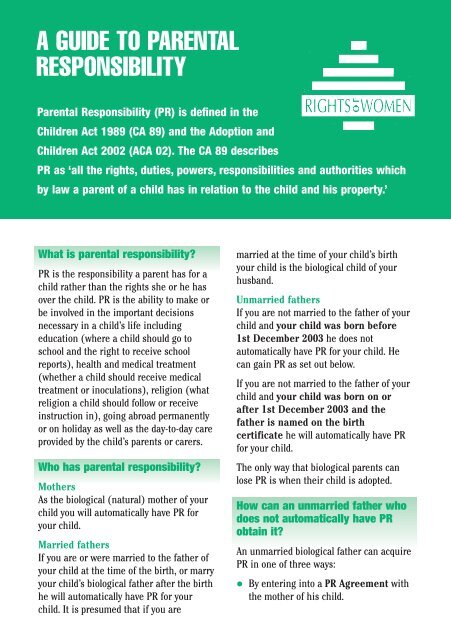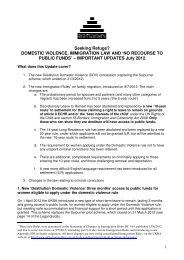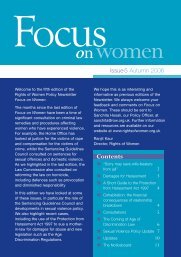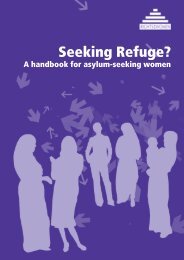Parental Responsibility - Rights of Women
Parental Responsibility - Rights of Women
Parental Responsibility - Rights of Women
Create successful ePaper yourself
Turn your PDF publications into a flip-book with our unique Google optimized e-Paper software.
A GUIDE TO PARENTAL<br />
RESPONSIBILITY<br />
<strong>Parental</strong> <strong>Responsibility</strong> (PR) is defined in the<br />
Children Act 1989 (CA 89) and the Adoption and<br />
Children Act 2002 (ACA 02). The CA 89 describes<br />
PR as ‘all the rights, duties, powers, responsibilities and authorities which<br />
by law a parent <strong>of</strong> a child has in relation to the child and his property.’<br />
What is parental responsibility?<br />
PR is the responsibility a parent has for a<br />
child rather than the rights she or he has<br />
over the child. PR is the ability to make or<br />
be involved in the important decisions<br />
necessary in a child’s life including<br />
education (where a child should go to<br />
school and the right to receive school<br />
reports), health and medical treatment<br />
(whether a child should receive medical<br />
treatment or inoculations), religion (what<br />
religion a child should follow or receive<br />
instruction in), going abroad permanently<br />
or on holiday as well as the day-to-day care<br />
provided by the child’s parents or carers.<br />
Who has parental responsibility?<br />
Mothers<br />
As the biological (natural) mother <strong>of</strong> your<br />
child you will automatically have PR for<br />
your child.<br />
Married fathers<br />
If you are or were married to the father <strong>of</strong><br />
your child at the time <strong>of</strong> the birth, or marry<br />
your child’s biological father after the birth<br />
he will automatically have PR for your<br />
child. It is presumed that if you are<br />
married at the time <strong>of</strong> your child’s birth<br />
your child is the biological child <strong>of</strong> your<br />
husband.<br />
Unmarried fathers<br />
If you are not married to the father <strong>of</strong> your<br />
child and your child was born before<br />
1st December 2003 he does not<br />
automatically have PR for your child. He<br />
can gain PR as set out below.<br />
If you are not married to the father <strong>of</strong> your<br />
child and your child was born on or<br />
after 1st December 2003 and the<br />
father is named on the birth<br />
certificate he will automatically have PR<br />
for your child.<br />
The only way that biological parents can<br />
lose PR is when their child is adopted.<br />
How can an unmarried father who<br />
does not automatically have PR<br />
obtain it?<br />
An unmarried biological father can acquire<br />
PR in one <strong>of</strong> three ways:<br />
By entering into a PR Agreement with<br />
the mother <strong>of</strong> his child.
Form C (PRA1) is available from the<br />
Magistrates Court, County Court or to<br />
download from the court service<br />
website (see Other useful telephone<br />
numbers below). Both parents must<br />
sign the form at court in front <strong>of</strong> either<br />
a magistrate or court <strong>of</strong>ficial and<br />
provide identification and your child’s<br />
birth certificate. The agreement must<br />
then be sent to the Principal Registry <strong>of</strong><br />
the Family Division to be lodged.<br />
By the court making a PR order<br />
An unmarried biological father has the<br />
right to apply to the court asking for a<br />
PR order. This application may be made<br />
at the same time as any other<br />
application, such as contact or<br />
residence. The father will have PR until<br />
his child is 18 or the order is brought to<br />
an end by the court. It is extremely rare<br />
for the court to terminate a father’s PR.<br />
By subsequently marrying the<br />
mother<br />
If the biological father marries the<br />
biological mother <strong>of</strong> his child after the<br />
birth, the father will acquire PR.<br />
What about non-parents?<br />
Other people can also acquire PR for your<br />
child. These might include step-parents,<br />
grandparents or same-sex partners. Nonparents<br />
can acquire PR for a child if:<br />
They adopt the child<br />
When an adoption order is made the<br />
adoptive parent or parents gain PR for<br />
the child and the biological parents lose<br />
PR. If the adoption is a joint adoption<br />
between a biological parent and her or<br />
his partner, when the adoption order is<br />
made the biological parent who is<br />
adopting keeps PR, the person they are<br />
adopting with gains it and any other<br />
person who has PR loses it.<br />
They are appointed as a guardian <strong>of</strong><br />
the child.<br />
A person with PR can appoint another<br />
person to be the child’s guardian after<br />
his or her death. The appointment can<br />
be made in writing (and must be signed<br />
and dated) or in a will. The appointment<br />
will only take effect on the death <strong>of</strong> the<br />
person making the appointment. If<br />
there is no-one with PR for a child the<br />
court may appoint a guardian.<br />
The court makes a residence order in<br />
their favour.<br />
When the court makes a residence<br />
order in favour <strong>of</strong> a non-parent, the<br />
person with the residence order<br />
acquires PR for the child. That person<br />
will have PR for the duration <strong>of</strong> the<br />
residence order but PR would be lost if<br />
the order is brought to an end by the<br />
court.<br />
The court makes a special<br />
guardianship order.<br />
This order is an alternative to adoption.<br />
It provides the child with a legally<br />
secure family home but unlike adoption<br />
the parents do not lose their PR. A<br />
special guardian, however, can overrule<br />
the PR <strong>of</strong> the parents when making<br />
decisions about the child.<br />
Married step parents and civil partners<br />
Married step-parents and civil partners can<br />
now acquire PR for a step child or child <strong>of</strong><br />
the family by either entering into a PR<br />
agreement or by asking the court to make<br />
a PR order. Form C (PRA2) is available<br />
from the Magistrates Court, County Court<br />
or to download from the court service<br />
website.
For further information about these issues<br />
please see our Guide to Residence<br />
Orders and Guide to Lesbian Parenting.<br />
Local Authorities<br />
A local authority social services department<br />
can acquire PR for a child if the court<br />
makes a care order (including an<br />
emergemcy protection order or interim<br />
care order) in respect <strong>of</strong> that child. The<br />
local authority will then share PR with<br />
anyone else who has PR for the child.<br />
What does having PR mean?<br />
The CA 89 allows everyone who has PR to<br />
be involved in the important decisions that<br />
have to be made as your child grows up.<br />
This includes decisions about education,<br />
health and medical treatment, religion and<br />
leaving the country. If more than one<br />
person has PR, they should try to reach an<br />
agreement about the decision but if they<br />
cannot, then either <strong>of</strong> them can apply to<br />
the court for a decision. This is called an<br />
application for a specific issue order.<br />
The court can also stop a person with PR<br />
from making a decision about a child (for<br />
example removing them from school or<br />
taking them abroad) by making a<br />
prohibited steps order. When making<br />
any decision about any aspect <strong>of</strong> a child’s<br />
upbringing, the child’s welfare is the most<br />
important factor the court will consider.<br />
For further information about these issues<br />
see our information sheet When Parents<br />
Separate.<br />
More than one person can have PR for a<br />
child. With the exception <strong>of</strong> special<br />
guardians (see above), no one person has<br />
a greater right to have a say in decisions<br />
than the other or others with PR and no<br />
one can override a decision made by the<br />
other without a court order to do so.<br />
Everyone with PR has an equal right to<br />
make or be involved in the important<br />
decisions in a child’s life.<br />
However, the law recognises that the<br />
exercise <strong>of</strong> PR has to be realistic. For<br />
example when a couple separate, the<br />
person with whom the child lives is<br />
allowed to make all the day-to-day<br />
decisions about the child. Having PR does<br />
not give a non-resident parent the right to<br />
interfere in the day-to-day management <strong>of</strong><br />
the child’s life.<br />
If another person subsequently acquires<br />
PR for a child the other people who already<br />
have PR do not lose it unless the court<br />
makes an order. PR cannot be surrendered<br />
or transferred to another person by the<br />
person with PR.<br />
What will the court consider in a<br />
PR application?<br />
The CA 89 says that when the court makes<br />
any decision about a child, the child’s<br />
welfare must be the court’s “paramount<br />
consideration”. This means it must<br />
consider the child’s welfare above<br />
everything else. When making a decision<br />
the court must consider all your child’s<br />
circumstances and in particular the<br />
following factors:<br />
your child’s wishes and feelings<br />
depending on her or his age and<br />
understanding (generally the older your<br />
child is the more attention the court will<br />
pay to those wishes and feelings)<br />
your child’s physical, emotional and<br />
educational needs (this includes<br />
practical needs such as accommodation<br />
and food as well as love and affection)<br />
the likely effect on your child <strong>of</strong> any<br />
change in her or his circumstances<br />
(the court will look at the previous or
existing arrangements for contact and<br />
generally considers that change is<br />
disruptive to a child)<br />
your child’s age, sex, background<br />
and any characteristics the court<br />
thinks relevant (this could include any<br />
cultural or religious needs your child<br />
has or any special needs or disability<br />
that might affect contact arrangements)<br />
any harm your child has suffered or<br />
is at risk <strong>of</strong> suffering (this includes<br />
physical, sexual or emotional abuse and<br />
now also includes any domestic violence<br />
your child has seen or heard)<br />
how capable both parents are <strong>of</strong><br />
meeting your child’s needs (the court<br />
can consider whether the non-resident<br />
parent has the skills to look after your<br />
child and can consider whether these<br />
are impaired, for example, by substance<br />
misuse)<br />
the range <strong>of</strong> powers available to the<br />
court (the court can choose from a very<br />
wide range <strong>of</strong> different contact<br />
arrangements from direct to indirect<br />
contact to no contact at all)<br />
In particular when deciding whether a<br />
father should have PR the court will<br />
consider<br />
whether the father, by his actions<br />
during and since the application, has<br />
shown sufficient commitment to the<br />
child to justify giving him PR<br />
what the level <strong>of</strong> attachment is between<br />
the father and the child<br />
his reasons for applying for PR<br />
It is more likely than not that the court will<br />
give an unmarried father PR. Even in<br />
cases where a father applies for a contact<br />
or residence order and does not succeed,<br />
the court may still grant PR as it gives the<br />
status <strong>of</strong> fatherhood that he would have<br />
had if he were married to the mother or<br />
named on the birth certificate.<br />
Maintenance and PR<br />
Even if a father does not have PR, he is<br />
still required to financially support his<br />
child. Paying maintenance does not give a<br />
biological father PR or entitle him to have<br />
it. Nor should the fact that a father does<br />
not pay maintenance be used as a reason<br />
to withhold PR. For further information on<br />
child support see our Guide to Child<br />
Maintenance.<br />
The issues relating to PR can be<br />
complex and we have provided a very<br />
basic overview <strong>of</strong> terminology, law and<br />
court practice and procedure. We<br />
would also strongly advise you to seek<br />
legal advice by either telephoning our<br />
legal advice line or a solicitor.<br />
Please note that the law as set out in this information sheet is the law as it<br />
stood at the date <strong>of</strong> publication. The law may have changed since then and<br />
accordingly you are advised to take up to date legal advice. <strong>Rights</strong> <strong>of</strong> <strong>Women</strong><br />
cannot accept responsibility for any reliance placed on the legal information<br />
contained in this information sheet. This information sheet is designed to give<br />
general information only.<br />
© <strong>Rights</strong> <strong>of</strong> <strong>Women</strong> January 2007
Order Form<br />
The Child Contact<br />
Handbook (Second edition)<br />
Your details<br />
Name . . . . . . . . . . . . . . . . . . . . . . . . . . . . . . . . . . . . . . . . . . . . . . . . . . . . . . . . .<br />
Address . . . . . . . . . . . . . . . . . . . . . . . . . . . . . . . . . . . . . . . . . . . . . . . . . . . . . . .<br />
. . . . . . . . . . . . . . . . . . . . . . . . . . . . . . . . . . . . . . . . . . . . . . . . . . . . . . . . . . . . . .<br />
Telephone . . . . . . . . . . . . . . . . . . . . . . . . Fax . . . . . . . . . . . . . . . . . . . . . . . .<br />
Email . . . . . . . . . . . . . . . . . . . . . . . . . . . . . . . . . . . . . . . . . . . . . . . . . . . . . . . . .<br />
Number <strong>of</strong> copies required . . . . . . . . . . . . . . . . . . . . . . . . . . . . . . . . . . . . . . .<br />
Please return your completed form with a cheque for £8 per copy payable<br />
to <strong>Rights</strong> <strong>of</strong> <strong>Women</strong> to:<br />
<strong>Rights</strong> <strong>of</strong> <strong>Women</strong>, 52-54 Featherstone Street, London EC1Y 8RT<br />
We will send your book/s within 28 days <strong>of</strong> receiving your order.<br />
<strong>Rights</strong> <strong>of</strong> <strong>Women</strong> can be contacted at 020 7251 6575/6 (admin), 020 7490 2562<br />
(textphone), or by email at info@row.org.uk.<br />
For more information on <strong>Rights</strong> <strong>of</strong> <strong>Women</strong>, the publications we produce and<br />
services we <strong>of</strong>fer please go to our website at www.rights<strong>of</strong>women.org.uk.<br />
Industrial and Provident Society No 23221R.
For free confidential legal advice on family law including divorce and<br />
relationship breakdown, children and contact issues, domestic violence and<br />
lesbian parenting call the <strong>Rights</strong> <strong>of</strong> <strong>Women</strong> Advice Line on<br />
020 7251 6577 (telephone) or 020 7490 2562 (textphone).<br />
Tuesday, Wednesday and Thursday 2pm – 4pm and 7pm – 9pm<br />
Friday 12 noon – 2pm<br />
For free confidential legal advice on sexual violence and the criminal law<br />
please call our Sexual Violence Advice Line on<br />
020 7251 8887 (telephone) or 020 7490 2562 (textphone).<br />
Mondays 11am – 1pm, Tuesdays 10am – 12 noon<br />
Other useful telephone numbers<br />
Child Support Agency 08457 133 133 www.csa.gov.uk<br />
Community Legal Service Direct 0845 345 4345 www.clsdirect.org.uk<br />
(for finding a family solicitor)<br />
Her Majesty’s Court Service<br />
www.hmcourts-service.gov.uk<br />
National Domestic Violence Helpline 0808 2000 247 wwwwomensaid.org.uk<br />
National Family Mediation 01392 271610 www.nfm.org.uk<br />
One Parent Families 0800 018 5026 www.oneparentfamilies.org.uk<br />
Relate 0845 130 4016 www.relate.org.uk<br />
Resolution 01689 820272 www.resolution.org.uk<br />
(for finding a family solicitor)<br />
Samaritans 08457 909090 www.samaritans.org.uk<br />
<strong>Rights</strong> <strong>of</strong> <strong>Women</strong>, 52-54 Featherstone Street, London EC1Y 8RT<br />
Office/Admin: 020 7251 6575/6 Textphone: 020 7490 2562<br />
Fax: 020 7490 5377<br />
Email: info@row.org.uk<br />
Website: www.rights<strong>of</strong>women.org.uk<br />
Industrial and Provident Society No: 23221R
















